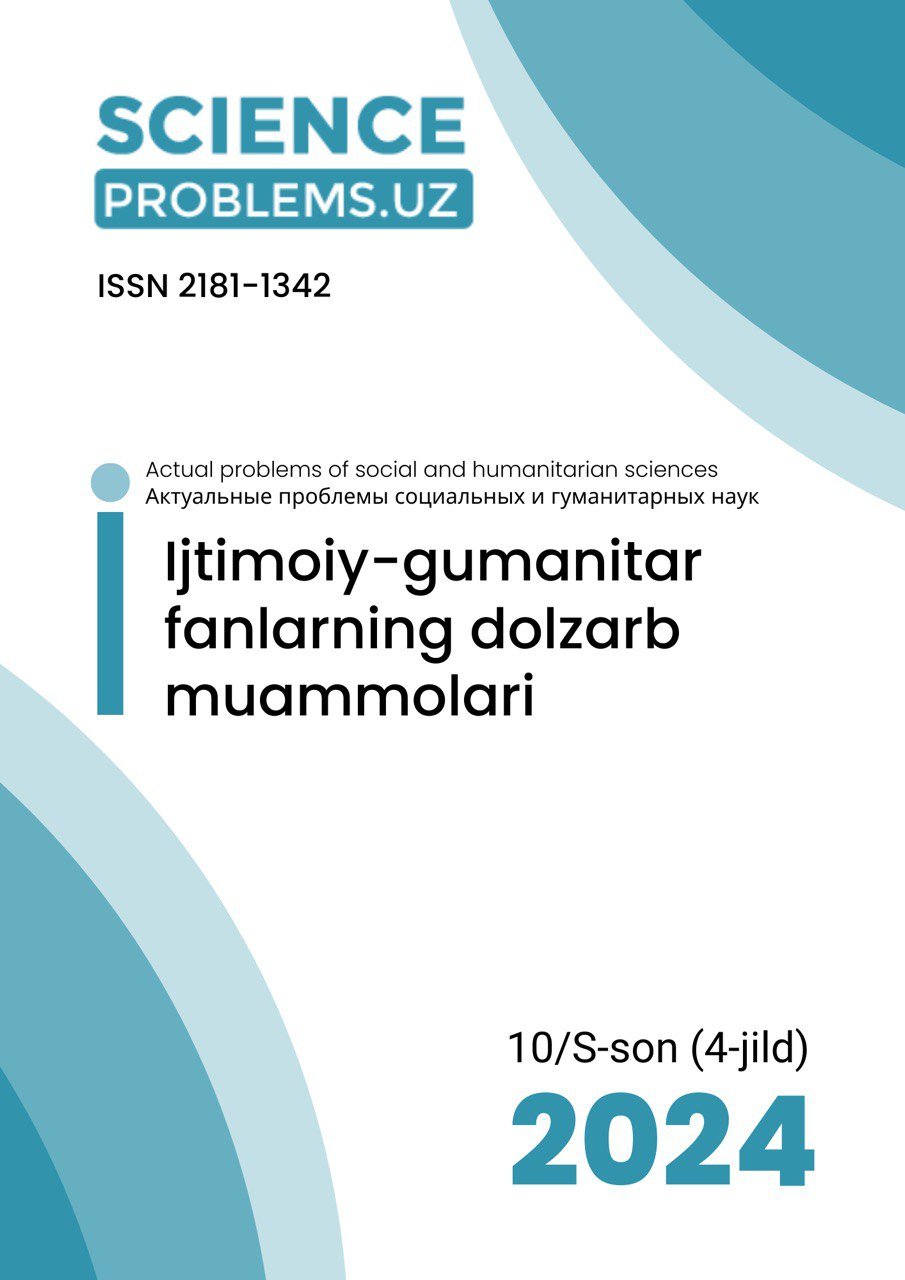БЎЛАЖАК ИҚТИСОДЧИЛАРДА АНАЛИТИК ТАФАККУРНИ РИВОЖЛАНТИРИШ САМАРАДОРЛИГИНИ ТАЪМИНЛАШНИНГ ПЕДАГОГИК ВОСИТАЛАРИ
Kalit so'zlar
https://doi.org/10.47390/SPR1342V4SI10Y2024N43Kalit so'zlar
фикрлаш, аналитик фикрлаш, бўлғуси иқтисодчи, таълим, олий таълим, таълим ва тарбия жараёни, метод, дебатлар, методик талаблар, таълим ва тарбия самарадорлиги, бахс-мунозара, мустақил фикр.Annotasiya
Мақолада бўлғуси иқтисодчиларда аналитик тафаккурни ривожлантиришнинг замонавий педагогик шарт-шароитлари, омиллари, босқичлари, компонентлари, усуллари таҳлил қилинган. Шунингдек, мақолада бўлғуси иқтисодчиларда аналитик тафаккур юритиш кўникмаларининг педагогик-иерархик тизими, намоён бўлиш шакллари тадқиқ қилинган.
Manbalar
1. Фалсафа фанини ўқитиш методикаси. –Тошкент.: Ўзбекистон. 2001. –Б. 78.
2. Мирқосимова, M. M. (2020) Tалабаларда аналитик тафаккурни ривожлантириш технологияси. Scientific Bulletin of Namangan State University: Vol. 2 : Iss. 4 , Article 89.
3. Alimjonova, G. (2021). MODERN COMPETENCIES IN THE TECHNO-CULTURE OF FUTURE TECHNICAL SPECIALISTS. CURRENT RESEARCH JOURNAL OF PEDAGOGICS (2767-3278), 2(06), 78-84.
4. Alimjonova, G. (2021). The need for integration of social and technical knowledge in the development of technological culture of students of higher technical educational institutions. ACADEMICIA: An International Multidisciplinary Research Journal, 11(3), 502-510.
5. Alimjonova, G. I. (2019). SOLUTION OF THE GOURSAT PROBLEM USING A TRANSFORMATION OPERATOR FOR A THIRD-ORDER PSEUDOPARABOLIC EQUATION WITH SINGULAR COEFFICIENTS. Scientific-technical journal, 22(2), 145-148.
6. Bakhromovich SI. The impact of managerial professional development on the effectiveness of Higher Education institution management. Academicia: an international multidisciplinary research journal. 2020;10(12):1014-20.
7. Siddikov, I. B. (2019). Философско-педагогические аспекты развития интеллектуальной культуры студентов. Вестник Ошского государственного университета, (3), 38-42.
8. Bakhromovich, S. I. Development trends and transformation processes in academic mobility in higher education in Uzbekistan and the world.
9. Bakhromovich, S. I. (2021). A comparative induction of the epistemological and theological views of medieval Islamic oriental scholars. Berlin Studies Transnational Journal of Science and Humanities, 1(1.7 Philosophical sciences).
10. Bakhromovich, S. I. (2021). Views on the role of science in human and society life in islamic teaching. International Journal of Philosophical Studies and Social Sciences, 1(3), 79-86.
11. Bakhromovich, S. I. (2020). Effects of Objective and Subjective Factors to Develop Intellectual Culture of Youth. Canadian Social Science, 16 (2), 55-59 p.
12. Bakhromovich, S. I. (2018). Social and philisophical performance of making youth’s intellectual culture. European science review, (7-8).
13. Bakhromovich, S. I. (2020). Analysis Of Modern Approaches To Ensuring The Effectiveness Of Management In Higher Education Institutions. The American Journal of Social Science and Education Innovations, 2(12), 364-369.
14. Bakhromovich, S. I. (2021). Philosophical comparative studies of the epistemological and theological views of medieval eastern scholars. Turkish Journal of Physiotherapy and Rehabilitation. Turkey, 2021. №32 (3), (Scopus) – P. 30338-30355
15. Bakhromovich, S. I. (2022).Dialectical and synergetic features of the development of theological and epistemological views in medieval eastern islam. European Journal of Humanities and Educational Advancements (EJHEA), - Las Palmas, Spain, Volume 3, Issue 2 February, 2022. – P. 79-83








